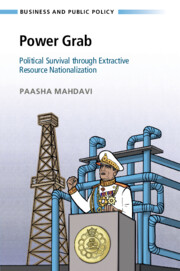32 results
11 - Contests, Institutions, Wars, and Economic Success
- from Part III - Applications
-
- Book:
- Contests
- Published online:
- 30 May 2024
- Print publication:
- 06 June 2024, pp 165-182
-
- Chapter
- Export citation
10 - Contests in Classical Problems: Divisionalization, Monopoly Welfare Losses, Coase Theorem, Voting
- from Part III - Applications
-
- Book:
- Contests
- Published online:
- 30 May 2024
- Print publication:
- 06 June 2024, pp 150-164
-
- Chapter
- Export citation
13 - What Determines the Allocation of Entrepreneurial Talents?
- from Part IV - Institutional Ecology of Entrepreneurship
-
- Book:
- Re-Understanding Entrepreneurship
- Published online:
- 02 May 2024
- Print publication:
- 02 May 2024, pp 243-268
-
- Chapter
- Export citation
12 - Practitioner Views of Corporate Political Responsibility
- from Section V - Implementing Corporate Political Responsibility: Opportunities and Challenges
-
-
- Book:
- Corporate Political Responsibility
- Published online:
- 16 November 2023
- Print publication:
- 30 November 2023, pp 355-388
-
- Chapter
- Export citation
5 - The Cotton Sector
- from Part II - A Deeper Investigation of Some Key Sectors and Institutions
-
-
- Book:
- State Capture and Rent-Seeking in Benin
- Published online:
- 09 November 2023
- Print publication:
- 23 November 2023, pp 166-206
-
- Chapter
-
- You have access
- Open access
- HTML
- Export citation
6 - Fiscal Decentralisation as an Example of Institutional Ineffectiveness
- from Part II - Five Critical Institutional Areas for Tanzania’s Development
-
-
- Book:
- State and Business in Tanzania's Development
- Published online:
- 09 November 2023
- Print publication:
- 23 November 2023, pp 191-207
-
- Chapter
-
- You have access
- Open access
- HTML
- Export citation
2 - Exploring the Reasons behind Modest Economic Performance
- from Part I - An Overview of Economic and Institutional Constraints on Benin’s Development
-
-
- Book:
- State Capture and Rent-Seeking in Benin
- Published online:
- 09 November 2023
- Print publication:
- 23 November 2023, pp 43-87
-
- Chapter
-
- You have access
- Open access
- HTML
- Export citation
6 - Conclusion
-
- Book:
- Making Democracy Safe for Busines
- Published online:
- 22 June 2023
- Print publication:
- 06 July 2023, pp 169-176
-
- Chapter
- Export citation
1 - How Firms Respond to Regime Change
-
- Book:
- Making Democracy Safe for Busines
- Published online:
- 22 June 2023
- Print publication:
- 06 July 2023, pp 8-45
-
- Chapter
- Export citation
The impact of economic institutions on government policy: does contract-intensive economy promote impartial governance?
-
- Journal:
- Journal of Institutional Economics / Volume 19 / Issue 1 / February 2023
- Published online by Cambridge University Press:
- 09 January 2023, pp. 119-136
-
- Article
- Export citation
PREDISTRIBUTION AGAINST RENT-SEEKING: THE BENEFIT PRINCIPLE’S ALTERNATIVE TO REDISTRIBUTIVE TAXATION
-
- Journal:
- Social Philosophy and Policy / Volume 39 / Issue 1 / Summer 2022
- Published online by Cambridge University Press:
- 14 August 2023, pp. 188-207
- Print publication:
- Summer 2022
-
- Article
-
- You have access
- Open access
- HTML
- Export citation
Chapter 2 - Democracy Thrives in Darkness
-
- Book:
- Secret Government
- Published online:
- 04 November 2021
- Print publication:
- 11 November 2021, pp 35-63
-
- Chapter
- Export citation
Those who can't sort, steal: caste, occupational mobility, and rent-seeking in rural India
-
- Journal:
- Journal of Demographic Economics / Volume 87 / Issue 1 / March 2021
- Published online by Cambridge University Press:
- 01 March 2021, pp. 107-140
-
- Article
-
- You have access
- Open access
- HTML
- Export citation
3 - States, Markets, and Energy Transition: Good Industrial Policy?
-
- Book:
- Political Economies of Energy Transition
- Published online:
- 12 November 2020
- Print publication:
- 26 November 2020, pp 79-131
-
- Chapter
- Export citation
6 - Rents, Control, and Reciprocity
- from Part II - Economic, Legal, and Political Control of the Developmental State
-
- Book:
- Decadent Developmentalism
- Published online:
- 04 November 2020
- Print publication:
- 12 November 2020, pp 157-193
-
- Chapter
- Export citation
2 - The Theory of Political Survival through Nationalization
-
- Book:
- Power Grab
- Published online:
- 31 March 2020
- Print publication:
- 02 April 2020, pp 38-90
-
- Chapter
- Export citation

Power Grab
- Political Survival through Extractive Resource Nationalization
-
- Published online:
- 31 March 2020
- Print publication:
- 02 April 2020
6 - Cross-National Variation in Sovereignty and Hierarchy
-
- Book:
- Political Survival and Sovereignty in International Relations
- Published online:
- 09 March 2020
- Print publication:
- 12 March 2020, pp 181-216
-
- Chapter
- Export citation
2 - Submission, Resistance, and War
-
- Book:
- Political Survival and Sovereignty in International Relations
- Published online:
- 09 March 2020
- Print publication:
- 12 March 2020, pp 49-96
-
- Chapter
- Export citation
4 - Mass Politics and the Surrender of Sovereignty
-
- Book:
- Political Survival and Sovereignty in International Relations
- Published online:
- 09 March 2020
- Print publication:
- 12 March 2020, pp 125-149
-
- Chapter
- Export citation



